- Home
- Steven Ehrman
The Spider Web (A Sherlock Holmes Uncovered Tale Book 4) Page 13
The Spider Web (A Sherlock Holmes Uncovered Tale Book 4) Read online
Page 13
“Complete and utter rot,” said George Hardwick. “This is very weak tea indeed, young man.”
“It could not have happened as you say,” chimed in Robert Hardwick. “There is no way that one of us could have left without the other noticing. I will swear to that.”
“Mr. Holmes, I believe that you are quite out of your depths,” said Agatha Hardwick. “Next you will be accusing me of killing poor John.”
“I have not accused anyone of murder as yet, Miss Hardwick,” said I. “But I have not forgotten about you. It has been almost completely overlooked, but you have no alibi at all. As soon as everyone else left the great hall you were unobserved until Percy and I returned. At any time after Miss Grafton left you, and until the alarm was raised you could have easily gone into the music room, been surprised by your brother, and killed him.”
“But what is my possible motive young man? You spoke of an inheritance lost, but I stood to gain nothing from John. It was well known that the estate and the money were to go to the next generation. Killing John brought me nothing.”
“Nothing, except that you prevented the estate from falling into the hands of a young woman, and her possible issue. It is a powerful motive indeed for you to save the inheritance of Sir John for the children of your brothers and sister.”
Another silence enveloped the room. Most faces seemed thoughtful, save that of Miss Hardwick who registered her disapproval of the entire exercise with her icy stare upon me. Finally, Inspector Grey spoke.
“Mr. Holmes, that covers everyone, but I did not allow you to make your presentation so that you could vaguely indict everyone. You made a claim to me that you know the killer and that you have proof. I ask for it now.”
“Very well, Inspector,” I said. “I was provided with a clue to the identity of the culprit before I ever landed at Hardwick Hall, when my friend Percy gave me a brief biography of each member of Sir John’s family. I did not realize it was a clue because the crime had not yet been committed. Once the crime had been committed, I knew at once who was the most likely suspect. Subsequent investigation proved that I was correct.”
“Do you mean something I told you about one of my relatives was a clue that told you they were a murderer?” asked Percy.
“Not a murderer,” said I. “Everyone has continually skipped over the impetus of the crime for the outcome. Murder was not planned for today. The fact that Sir John stumbled upon the crime that was planned was complete happenstance. No, the crime was the theft of the Spider Diamond. And not simply its theft, but rather its replacement. The culprit is clever and realized if a reasonable substitute could be made for the diamond, before it was gifted to Miss Stuart, then any discovery later that it was a fake would put suspicion on her. It was during this attempt that Sir John was killed.”
“But, Holmes,” cried Percy. “Sir John alone knew the combination to the safe. How would anyone hope to get into the thing short of forcing it?”
“You are correct, Percy. Sir John made it a point to share the combination with no one, but he could not help but to allude to it. A clever person overheard him and set this plan into action. Besides, forcing the safe would have alerted Sir John to the game. No, the culprit knew, or thought that they knew, what the combination was.”
I noticed one face during my presentation that seemed both slightly alarmed and amused.
“I believe that you have made vague accusations long enough, Mr. Holmes,” said George Hardwick. “Either name the culprit or give up the game.”
“Very well, Mr. Hardwick,” I said evenly. “It was you who murdered Sir John Hardwick.”
Chapter Twenty-One
“You’re mad,” cried George Hardwick, after a moment of stunned silence. “Inspector, I will visit this slander upon you. You are responsible for this man.”
The Inspector drew a deep breath and addressed me. “Mr. Holmes, I have given you every courtesy in this matter, but the alibi of Mr. Hardwick seems quite strong to me. How do you propose to break the alibi?”
“Let us set aside the issue of the alibi for a moment. Let us examine the character of the man. Mr. George Hardwick has led, by all appearances, a selfless life. He took care of a dying mother and has put aside any career he might have pursued to act as agent for his uncle for many years. Suddenly, he sees all of that lifetime of effort about to be thrown on the rubbish heap and the fortune he long thought would be his, at least a large portion of it, might be lost to a young wife and offspring. With that in mind, that very day Sir John made his announcement George Hardwick set a plan in motion that culminated in the events of this day.
“He knew that his uncle’s fortune had ebbed to a great degree, but he thought there would be many years to replenish the family coffers. However, the surprise engagement, and his uncle’s announcement that he would make his bride a gift of the Spider Diamond within a fortnight drove him to desperate measures. He would not only steal the diamond, he would replace it so that no suspicion might fall upon him if the diamond was found to be a fake in the future. Now what he needed was a facsimile of the diamond. Now it is a famous stone, so having a fake diamond manufactured might cause tongues to wag, and especially if the switch was discovered later. But George Hardwick need not employ anyone to make such a stone. He did it himself.”
“How would a country gentlemen, such as George Hardwick, acquire that knowledge, Mr. Holmes?” asked Inspector Grey.
“Percy Hardwick told me before we ever arrived here at the hall that George Hardwick’s father had been a jeweler of some note. The son undoubtedly learned something of his father’s art and employed it here. The laboratory that Sir John maintained had all the necessary molds, tools, and the like to perform the job. George Hardwick was known to use the laboratory, so it would not be noticed that spent time there making his false jewel.”
“Mr. Holmes,” began Grey. “How do you know a false jewel even existed?
“Because George Hardwick left it in the music room.”
“Do you mean there are two diamonds in the safe?” asked the Inspector incredulously.
“No, Inspector. The real diamond may or may not be in the safe. I do not know for certain, but the fake stone, the paste one, was left in plain sight, yet hidden.”
“Again you speak in riddles, Mr. Holmes,” complained the Inspector. “How could it be in plain sight, yet hidden?”
“Mr. Hardwick crushed it under his shoe near the door,” I replied. “He hoped that it would be taken for ordinary glass, but his hope has not been born out. I noticed it and took a sample of it. The material is not ordinary glass. It is a paste mixture known as strass stone. I have written a slight monograph on the subject of strass stone. They are an eighteenth century invention used in the creation of high quality imitation gems. Here is where the plan went first astray.
“Unknown to George Hardwick, his uncle found that sleep was impossible, due to the very strong Indian coffee he had consumed. He came down by the back stairs and looked into the study for Miss Stuart, but she was in the secretary’s room and he did not see her. He then crossed over through the smoking room and then the drawing room. He did not see the sleeping Hudson, on account of the high backed sofa and continued into the music room hoping to find his fiancé. At this moment, George Hardwick was attempting to open the safe and he was surprised when his uncle walked in. Sir John was startled at finding him, but it was immediately apparent what his nephew was up to. George Hardwick snatches the club and it is done, but now the charge is murder. What does he do? I have watched Mr. Hardwick play chess. He is a good strategic player, but he excels when the game breaks down and each player must think on his feet. He realizes that to be caught with the imitation gem is tantamount to a confession to the crime. The entire house may be searched at any minute. He crushes the stone, hoping the gem is undetected. He opens the window and opens the door to the drawing room. In this manner, the unknown killer will be thought to have two methods of egress. He then retires and goes back to the conse
rvatory to continue his chess match. He does not realize that Hudson is asleep in the drawing room. When Hudson goes into the music room and discovers the body, he does both a favor to the killer and a disservice to him. Firstly, he does a favor by drinking some brandy in his shock. The misplaced bottle that I noticed ties in with the broken glass and might have helped the strass stone material remain hidden, but he also closes and bolts the door to the drawing room. Hudson is desperate to keep the drawing room away from attention. At any rate, the deed is now done and the uncle is dead and all is as it was. The two nephews and the niece are in line to inherit the remains of Sir John’s fortune. Even Percy will likely find a small remembrance from his distance uncle. The hope is that the mystery will remain unsolved and that an intruder will be regarded as the most likely culprit. Perhaps, even some tramp or rogue might be arrested and the issue will be settled. Unfortunately, he did not account for my presence and the plan went astray.”
George Hardwick was casually addressing a fleck of dust on his lapel, and said nothing. Robert Hardwick, and indeed most of the others, seemed stunned, but it was Agatha Hardwick’s expression that most intrigued me. She seemed at peace and yet, very sad.
“What say you to this, Mr. Hardwick?” asked Grey. “Do you deny the charges Mr. Holmes has made?”
“I am not certain that anything that Mr. Holmes has said rises to the level of a charge,” he replied airily. “All I have heard is the musings of a callow youth. I was playing chess with Robert as everyone knows, and my dear cousin is not the most likely person to give me an alibi. He would just as soon see me swing for the crime as help me.”
“Do you have anything else, Mr. Holmes,” asked the Inspector. “If you have given your fullest, I must admit that I have misplaced my trust in your abilities.”
“There is more, Inspector,” said I. “Let us dismiss the fact that the two cousins alibi each other. What other evidence is there that the two of them were in the conservatory at the time in question?”
“Why, Mr. Holmes, you know full well that they were both heard arguing by Miss Grafton and Miss Hardwick. What more is needed?”
“Let me relate an incident that happened in my first hour in this house. At that meal the two cousins were arguing, as they usually do. And also, as is usual, Robert was getting the best of his cousin. When George Hardwick protested that they should not act in that manner in front of guests, Robert Hardwick parroted his words back at him. The mimicry was uncanny and when the announcement of the engagement was made, and when George Hardwick saw his fortune fading away, it was also the germination of a plan. George and Robert left the room together that day and I believe that they hatched a way that they could steal the diamond and cover the theft with the imitation that George would produce. If anything went astray, they could alibi each other through Robert’s skill at aping his cousins speech.”
“Holmes, do you mean to say that when everyone heard Robert and George arguing, it was actually only Robert?” asked Percy in amazement.
“That is exactly it, Percy. They were well known adversaries and they were confident that no one would suspect them of acting in a conspiracy together, but they decided upon a way to cement that image. At the small gathering that night they pretended to have a violent disagreement and George struck his cousin. But oh, it was such a slight blow, delivered with the open hand. That bit of play acting, I rather fancy, was done for my benefit as I was a newcomer.”
“And was their fight today another bit of acting, Mr. Holmes?” asked Grey.
“Oddly it was not, although it did make it seem again as if the cousins were enemies,” said I. “No, this time the blow was in earnest. You must understand that although Robert Hardwick is a bit of a rogue, he is essentially a good person. His arguments with his cousin were only the result of his recognition that George Hardwick was a hypocrite, and that is why the blow. Robert would never have acceded to a murder plan, but he was just weak enough to go along with theft. When his uncle, whom he loved, was actually killed by George he was furious, but he was snared by his involvement. His cousin convinced him that the only way out was to continue with the plan. However, when George Hardwick insulted the memory of the uncle, it was too much for Robert and he struck George with vigor.”
“Robert, is this true?” asked Irene Stuart in a plaintive tone. “Tell me it is a lie.”
“Of course it is a lie,” answered George Hardwick in Robert’s place. “The entire thing is made up out of whole cloth.”
Robert Hardwick was sitting as if struck dumb. His face was drained of blood and he looked as though he might topple over at any moment.
“I believe you, Mr. Holmes,” said the Inspector slowly. “But a clever barrister would tear it to ribbons.”
“I am not finished, Inspector. After you left Percy and I in the hall earlier, I noticed an object under the sofa across from me. This is the table upon which the chess set normally sits when not in use, and I recalled that Irene Stuart bumped into Robert Hardwick, sending the pieces flying. This is what I found.”
I opened my hand and showed everyone.
“Why, it is the white ivory bishop, Mr. Holmes,” cried Jane Grafton.
“Just so, Miss Grafton. Now, I have made note of the positions of the game from when it was abandoned by Robert and George. By that time, both white bishops had already been sacrificed, as is the strategy in the Rasmussen Gambit, and to get to the point at which the game had progressed would have taken the good portion of an hour, but they could not have played the game with only one bishop. The game, therefore, was a blind meant to show that two men were in the room. In actuality the pieces were simply laid out in a classic end game position to give the illusion of time passing. Since the game was not played from the beginning, Robert and George Hardwick did not notice that the game piece was missing, and so their fate was sealed. Am I not correct, Robert?”
“Say nothing!” George Hardwick nearly screamed.
“Mr. Hardwick,” I said, addressing Robert. “Should you admit your part in this and cooperate with the authorities, I am certain that your involvement will be seen as slight and before the fact, but if you remain in this conspiracy with your cousin you will surely face murder charges with him.”
“I’m not a murderer,” he cried out. “It happened just as you said. When George told me he had killed uncle, I was stunned beyond measure. I swear I would have come forward.”
“You fool,” said George Hardwick, with venom. “Don’t you see that if we had hung together we would have prevailed? You allowed him to overawe you.”
“No, George,” he replied. “That is what I allowed you to do when you talked me into this mad scheme.”
Inspector Grey stepped forth and announced, “I arrest both of you in the name of the crown.”
Robert Hardwick seemed relieved that the game was up and he stood quietly. His cousin, on the other hand, had lost all of his bluster and nearly sank to the floor. The constable and the sergeant led both men from the room. Inspector Grey clapped me on the shoulder, but spoke no words as he also withdrew.
Chapter Twenty-Two
The next day broke with a bright sun. I was up before the rest, and made my way about the property before returning just as the rest of the household came down. The breakfast was a quiet one and the subject of the murder was forbidden by silent agreement. Following the meal, we all made our way to the great hall and sat. Percy sat on a sofa next to Jane Grafton, while Irene Stuart perched alone, somewhat apart from the family, on the other sofa. Agatha Hardwick took her usual chair and I remained standing in front of the fireplace. I found myself under the gaze of Miss Hardwick.
“Well, young man,” she began. “I suppose that this family owes you a debt. It pains me to think of the awful thing that Robert and George did, but at least John’s death is no longer a mystery and the pall his been lifted from the family.”
“Any service I have rendered, madam, I am happy to have supplied. The family owes me no debt.”
“Chance?” I repeated. “How so Percy?”
“Come now, Holmes, finding the missing bishop was simple happenstance. That you must admit.”
“I fear I must gainsay you, Percy. It was not chance. The fact that it was lost could be called chance, but not its discovery.”
“How so, Holmes?” Percy asked, repeating my own phrase in jest.
“Simply this. I talked several times how certain things stand out in the mind, even if not consciously noted, if they are unusual. I knew Hudson could not have walked by Miss Hardwick during the hour in question because, on a subconscious level, she knew servants were not supposed to be in the living quarters at that time. I knew that the gardeners would notice a stranger, but not a member of the family. I did not truly suspect Miss Grafton, but the rule stood. The chess piece was just an extension of that principle.”
“I know I must be thick, but I do not quite follow you, Holmes,” said Percy.
“I have noted several times the efficiency of the staff. They had cleaned the great hall that morning, so that no foreign matter should have been under the sofa. And even were I a complete fool, the Inspector used the phrase “swept under the sofa” in my presence. That was enough for my mind to make the connection when I saw something where it should not be. I found the piece and helped use it to break the spirit of Robert Hardwick, whom I judged to be the weak link in the conspiracy. Have I made myself clear?”
“I surrender,” said Percy, raising his arms. “In any case, as Aunt Agatha has said, we owe you a debt.”
“Well, perhaps we have helped Mr. Holmes in some manner already,” she said with a twinkle. “Percy here tells me that you have determined upon a career as a consulting detective, whatever that may be, and I believe that you can consider this your first success as a detective. You certainly left Grey and Grissom well to the rear in this matter.”

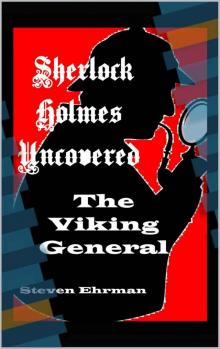 The Viking General (A Sherlock Holmes Uncovered Tale Book 9)
The Viking General (A Sherlock Holmes Uncovered Tale Book 9)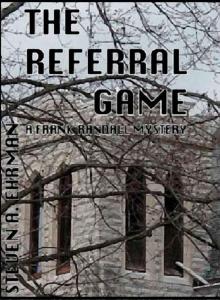 The Referral Game (A Frank Randall Mystery)
The Referral Game (A Frank Randall Mystery) Collection of Four Short Stories
Collection of Four Short Stories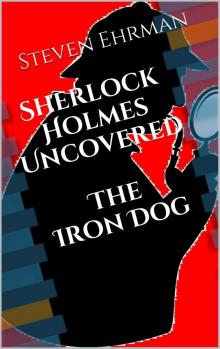 The Iron Dog (A Sherlock Holmes Uncovered Tale)
The Iron Dog (A Sherlock Holmes Uncovered Tale)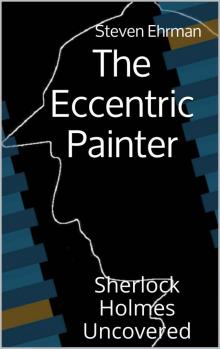 The Eccentric Painter (A Sherlock Holmes Uncovered Tale)
The Eccentric Painter (A Sherlock Holmes Uncovered Tale)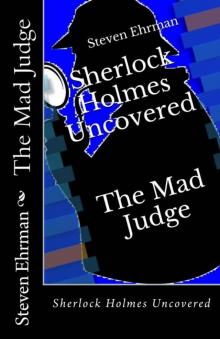 The Mad Judge (A Sherlock Holmes Uncovered Tale Book 3)
The Mad Judge (A Sherlock Holmes Uncovered Tale Book 3)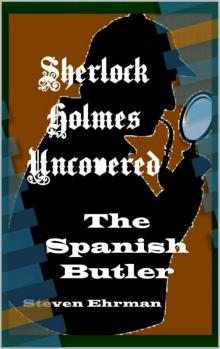 The Spanish Butler (A Sherlock Holmes Uncovered Tale Book 8)
The Spanish Butler (A Sherlock Holmes Uncovered Tale Book 8)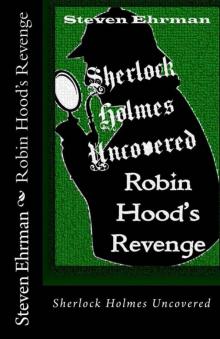 Robin Hood's Revenge (A Sherlock Holmes Uncovered Tale Book 7)
Robin Hood's Revenge (A Sherlock Holmes Uncovered Tale Book 7)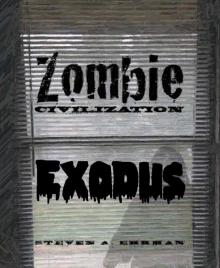 Zombie Civilization: Exodus (Zombie Civilization Saga Book 2)
Zombie Civilization: Exodus (Zombie Civilization Saga Book 2)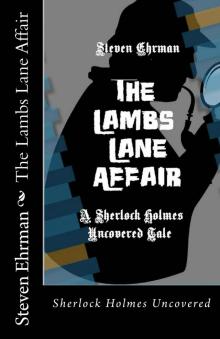 The Lambs Lane Affair (A Sherlock Holmes Uncovered Tale Book 5)
The Lambs Lane Affair (A Sherlock Holmes Uncovered Tale Book 5)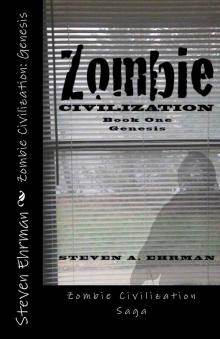 Zombie Civilization: Genesis (Zombie Civilization Saga)
Zombie Civilization: Genesis (Zombie Civilization Saga)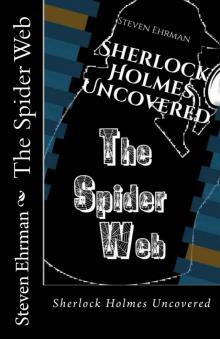 The Spider Web (A Sherlock Holmes Uncovered Tale Book 4)
The Spider Web (A Sherlock Holmes Uncovered Tale Book 4)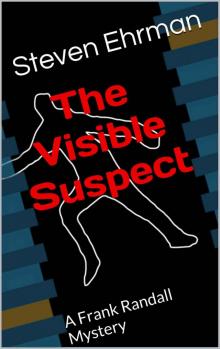 The Visible Suspect (A Frank Randall Mystery)
The Visible Suspect (A Frank Randall Mystery)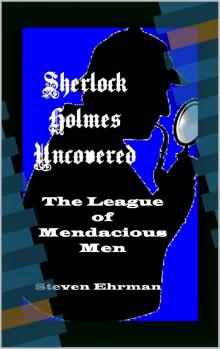 The League of Mendacious Men (A Sherlock Holmes Uncovered Tale Book 10)
The League of Mendacious Men (A Sherlock Holmes Uncovered Tale Book 10)